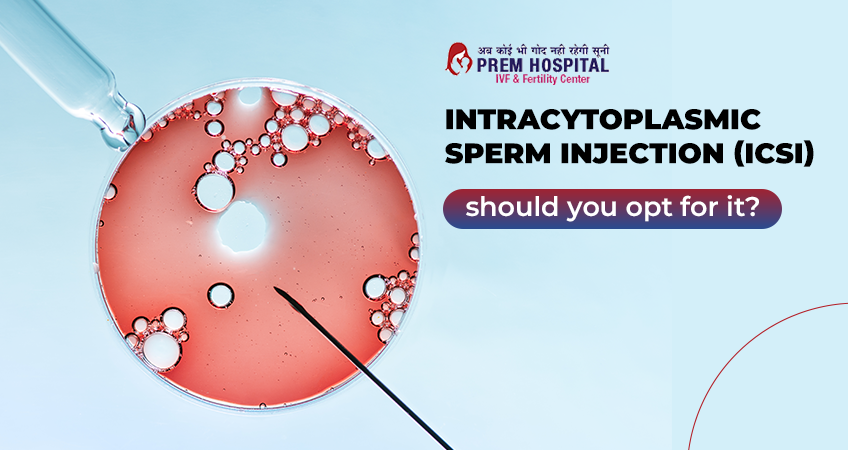Intracytoplasmic Sperm Injection (ICSI) is an infertility treatment in which the live sperm of a man is injected into a woman’s egg in a laboratory. It is done to fertilize the egg. ICSI is a kind of IVF that is usually performed in case of male infertility.
Patients who may require ICSI
This process is much helpful for people facing male infertility. Your doctor may recommend you ICSI in case of:
- Blockage in the male reproductive system
- Inability to ejaculate
- Lower sperm count and quality
- Retrograde ejaculation (in which sperm flows backwards into the bladder)
You may also require ICSI if:
- Earlier IVF was successful
- The woman is more than 35 years of age
- You are using frozen eggs for conceiving.
ICSI treatment for pregnancy
Before procedure
Before the ICSI fertility treatment procedure, your doctor will collect the egg and sperm through the following process:
Ovulation Induction
The woman providing eggs will receive injections for 8-14 days. It is given to ovulate multiple eggs simultaneously. After that, human chorionic gonadotropin (hCG) or Lupron injection is given for the final maturation of eggs.
Egg retrieval
Your doctor will retrieve eggs from the ovaries through ultrasound technology. In this process, micropipette, which is a tiny needle, is injected into single sperm. With ICSI or IVF, the fertilized egg grows in the lab before transferring it into the woman’s womb.
Unless you are using a frozen egg, the sperm collection and egg retrieval process will happen on the same day. The person giving his sperm:
- Must avoid masturbation 2-3 days before sperm collection.
- You can either masturbate at home or in the private room of the fertility clinic and collect the discharge in a container given by the lab. It would help if you hand over the sample within 60 min of ejaculation.
After receiving the sample, semen analysis is done immediately to know the mobility, volume and sperm quality.
During procedure
- Your doctor will keep the mature egg in place on the lab dish through a small tube attached to a suction bulb.
- With a thin needle, doctors will pick up a single sperm.
- They will then place the needle into the egg to make it reach the cytoplasm.
- After that, doctors will inject the sperm into the cytoplasm.
- The need will be removed.
After procedure
After ICSI fertility treatment, your doctor will examine the fertilized egg in a lab to determine the success of fertilization. A healthy egg should divide cells in 5-6 days to form a blastocyst. Your doctor will determine the mass and size of the blastocyst to know when the pregnancy will happen.
Embryo transfer will be done on the 5th or 6th day of egg retrieval, or if the patient wants, it can be delayed for a month or years. Your doctor will ask you about embryo transfer timings. Through ultrasound, your doctor will place a catheter into the vagina, and then the embryo will be injected into the uterus. For pregnancy to happen, the embryo must get attached to the uterus. Your doctor will advise you to wait two weeks before the pregnancy test.
ICSI is more successful for those who are facing male infertility issues. Usually, 50-80% of eggs are fertilized during the ICSI procedure. But below are some problems which may arrive during the procedure
- It may cause harm to some or all eggs during needle insertion.
- The egg may not fertilize after sperm injection
- Embryo development may stop in the lab or after transfer.
What is the time duration of ICSI treatment?
It takes around 4-6 weeks for the completion of one cycle. You and your partner must spend half a day in the hospital for sperm and egg collection. Between 2-5 days, couples are supposed to re-visit the clinic for an embryo transfer procedure. If a woman is under 40, she will be suggested to undergo three cycles of IVF, either with or without ICSI.
If the age is between 42-44 and the patient has never tried IVF and has no issues with low egg numbers, she will be offered one full cycle after discussing the implications of IVF and conceiving at this age.
Will ICSI have an impact on baby development?
In a natural pregnancy, there is around a 1.5-3% chance of giving birth to a baby with a congenital disability. In ICSI, birth defect chances are similar to IVF and slightly higher than natural conceiving. This risk is involved because of the infertility issues, not because of the treatment procedure.
Some conditions related to ICSI are Beckwith-Wiedemann syndrome, hypospadias, Angelman syndrome, or ex-chromosome abnormalities. Such issues are likely to occur in less than 1% of babies conceived through this technique.
Some infertility issues may be genetic. For instance, male children born with ICSI may have same infertility problems like their fathers.
Conclusion
You need to look for the best fertility hospital in Meerut to get positive results from the ICSI treatment. Clear all doubts before undergoing this procedure; you must know about the treatment and what is expected from you before opting for this treatment.

